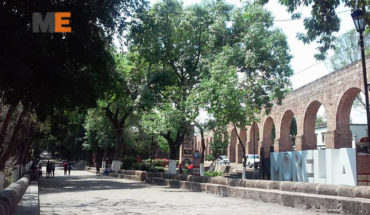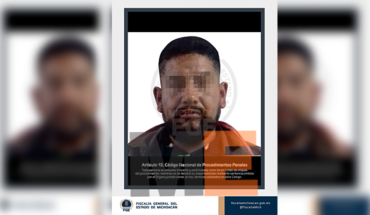The Inter-American Court of Human Rights (Inter-American Court of Human Rights) meets this Friday to discuss the case of two Mexicans who were imprisoned without trial for 17 years, which will probably result in a sentence that orders the Mexican State to eliminate this measure that allows the automatic imprisonment without judicial analysis of people accused of committing any of the crimes listed in Article 19 of the Constitution.
The session of the Inter-American Court takes place at the same time that in Mexico the issue is in full effervescence: yesterday it was announced that on September 5 the 11 ministers of the Supreme Court (SCJN) will analyze in full if informal preventive detention is a violation of human rights and international treaties.
The government of Andrés Manuel López Obrador publicly asked the ministers to keep this figure in the Constitution, under the argument that eliminating it would be a negative measure for the country’s security.
Now, what is the importance of what is decided this Friday in the Inter-American Court and how could it affect Mexico? The lawyers Ángela Frías, Javier Martín Reyes and Juan José Garza Onofre make an analysis of the keys to take into account.
17 years in prison without trial
The case that will be discussed this Friday is that of Daniel García Rodríguez and Reyes Alpízar Ortiz vs. Mexico. These are two Mexicans who were arrested and accused of having murdered in 2001 the councilor of Atizapán, María de los Ángeles Tamés.
The Inter-American Commission on Human Rights (IACHR) analyzed the accusation and determined that Daniel García and Reyes Alpízar were incriminated by the authorities through arbitrary detention and acts of torture, despite which both remained in informal preventive detention for 17 years. That is, they were in jail for almost two decades without a trial or a sentence, being legally innocent.
Once the case was analyzed, the IACHR presented it in May 2021 to the Inter-American Court, which will discuss it today.
What is the process like?
In the discussion this Friday will be, on the one hand, the victims and the prosecutors of the IACHR, who will expose what are the alleged grievances committed by the Mexican State, the damages that these would have caused and the reparation they demand. On the other hand, there will be the lawyers of the Mexican State.
“Surely, the representative of the Mexican State will defend the conventionality of the informal preventive detention measure. And on the other hand, we will see how the experts and representatives of the IACHR will try to give arguments to the judges of the Inter-American Court to rule on a conviction of the Mexican State for the excessive use of informal preventive detention,” said Ángela Frías, a criminal lawyer and professor at UNAM.
What are the possible scenarios?
Javier Martín Reyes, constitutional lawyer and researcher at the Institute of Legal Research of the UNAM, recalled that, prior to friday’s discussion, the Inter-American Court has already ruled repeatedly, pointing out that pretrial detention ex officio violates fundamental rights such as the presumption of innocence and the right to freedom.
For the Court, he explained, pretrial detention is only justified in three cases: when the freedom of the accused during his legal process may put the victims at risk, when there is a risk to the criminal process and when there is a justified risk of escape.
“What the Inter-American Court says is that judges must analyze case by case taking into account these three assumptions under the principles of suitability, necessity and proportionality, and that, in addition, pretrial detention must be reviewed periodically,” he said.
However, in Mexico, automatic pretrial detention does not currently meet any of these requirements, since it is sufficient that the accused person is accused and linked to trial for any of the crimes listed in article 19 of the Constitution – which include homicide to robbery with violence – so that he is sent to prison immediately without the judge entering to analyze other possible less restrictive precautionary measures, such as house arrest, passport delivery or going to sign periodically at the prison.
Given this context and the case of Daniel García and Reyes Alpízar, Ángela Frías considered that it is most likely that the Inter-American Court will rule in favor of the two victims, order the Mexican State to repair the damage and, in addition, declare the informal preventive detention unconventional, ordering the Mexican State to adjust its rules so that they do not contravene provisions of international order.
If this scenario occurs, we would be facing a historical resolutionIt would be the first time that Mexico has been forced to amend its Constitution by a provision that violates human rights.
Is it mandatory?
But is what the Inter-American Court decides binding on Mexico? Ángela Frías answered yes, since Mexico is part of the group of countries that signed the American Convention on Human Rights and that accepted the contentious jurisdiction of the Court. Therefore, it is obliged to comply with all its judgments and resolutions.
At this point, Frías explained that, once the sentence has been issued, the Court generates commissions to follow up on compliance with that sentence, even requesting semi-annual progress reports.
However, the lawyer clarified that the sentences are not usually of immediate compliance, and that it can take years before the defendant State complies with the requirements.
“From my point of view, the simplest thing to comply with the probable ruling of the Court would be for the State to summon the Mexican Congress to repeal the last part of the second paragraph of Article 19,” Frias said.
However, at this point political pressures also come into play.
“Perhaps, in this six-year term, the Court’s sentence would not be fulfilled, because of the vision that this government has that preventive detention is the answer to corruption and impunity,” said the lawyer, who considered “a mistake” the statement issued on Wednesday by the Mexican government, asking the ministers of the SCJN not to vote in favor of removing from the Constitution the preventive detention ex officio: “They are sending a message of fear to the citizenry, of ‘Hey, ministers, be careful because criminals are going to go out on the street,’ and that’s not the case.”
Animal Político and Intersecta published research that documented that pretrial detention has become a tool that mainly imprisons the poor and innocent, and that it has not lowered impunity rates. In addition, with the latest reform to article 19, promoted by the current government with the support of all parties in Congress, preventive imprisonment ex officio is now more than double what was allowed before, since today it is imprisoned even for a complaint of robbery with violence.
Does the Constitution kill international treaties?
Almost in parallel to this discussion in the Inter-American Court, on Monday, September 5, the 11 ministers of the SCJN will debate the future of informal pretrial detention.
For Juan José Garza Onofre, a researcher at the UNAM Research Institute, the coincidence in the dates is due to the fact that the “Supreme Court sometimes brings more political than legal times.”
“I think the Court of Mexico is playing a little bit to get ahead of this not being an international condemnation, to say: ‘Hey, we are in tune with you,'” he said.
This week two bills were announced, one by Minister Norma Piña and another by Minister Luis María Aguilar, and both propose to eliminate this figure under the argument that it violates rights and that it keeps people deprived of liberty for long periods without receiving a sentence.
The most immediate precedent to these two projects was another presented on May 25 by Minister Jorge Pardo, who, on the contrary, did propose to endorse informal preventive detention under the argument that, although it is not provided for in international human rights treaties to which Mexico is a party, it is in the Mexican Constitution and that is what should prevail.
“In colloquial terms, what Minister Pardo said is that ‘Constitution kills international treaties,'” explained Javier Martín Reyes.
Back then, the discussion took place in the First Chamber of the SCJN, where five ministers vote, unlike the 11 who will now have to vote in the plenary. The result was three votes against to two in favor, so Pardo’s project was discarded.
However, this argument that “the Constitution kills international treaties” may be one of the letters that ministers opposed to eliminating informal pretrial detention from the Constitution use in the next session of the plenary session of the SCJN to defend this legal figure.
What we do at Animal Político requires professional journalists, teamwork, dialogue with readers and something very important: independence. You can help us keep going. Be part of the team.
Subscribe to Animal Político, receive benefits and support free journalism.#YoSoyAnimal





